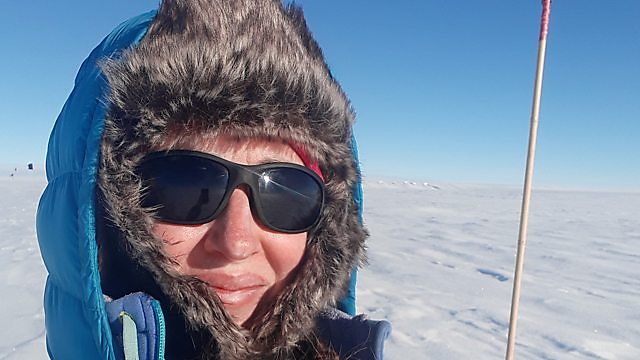Katherine Joy
Jim Al-Khalili talks to Katherine Joy about her work with moon rock.
Katherine Joy studies moon rock. She has studied lunar samples that were brought to earth by the Apollo missions (382kg in total) and hunted for lunar meteorites in Antarctica, camping on ice for weeks on end and travelling around on a skidoo.
Working at the forefront of the second wave of lunar exploration, she studied remote sensing data from Europe鈥檚 first mission to the moon, Smart 1 which launched in 2003 and data from many subsequent missions. She tells Jim Al-Khalili why she believes the moon is the most exciting destination in our solar system and explains what it can tell us about the long history of planet earth.
Beneath the magnificent desolation of the moon鈥檚 surface, multicoloured rocks contain vital clues about the history of our solar system. Every crater on the moon is evidence of a collision and the chemistry of these rocks tells us when these collisions took place. Katherine鈥檚 research supports the idea that a period known as the late heavy bombardment was a particularly turbulent time. Could the late heavy bombardment explain the origin of life on earth?
Last on
Broadcasts
- Mon 18 Nov 2019 20:32GMT主播大秀 World Service Australasia, Online, Americas and the Caribbean, Europe and the Middle East & UK DAB/Freeview only
- Mon 18 Nov 2019 21:32GMT主播大秀 World Service News Internet & East Asia only
- Tue 19 Nov 2019 05:32GMT主播大秀 World Service Online, UK DAB/Freeview, News Internet & Europe and the Middle East only
- Tue 19 Nov 2019 06:32GMT主播大秀 World Service Australasia, South Asia & Americas and the Caribbean only
- Tue 19 Nov 2019 07:32GMT主播大秀 World Service East and Southern Africa & East Asia only
- Tue 19 Nov 2019 11:32GMT主播大秀 World Service West and Central Africa
- Tue 19 Nov 2019 14:32GMT主播大秀 World Service Australasia
- Tue 19 Nov 2019 18:32GMT主播大秀 World Service East and Southern Africa, South Asia & West and Central Africa only
- Mon 25 Nov 2019 00:32GMT主播大秀 World Service
Space
The eclipses, spacecraft and astronauts changing our view of the Universe
The Curious Cases of Rutherford and Fry
Podcast
-
![]()
Discovery
Explorations in the world of science.



